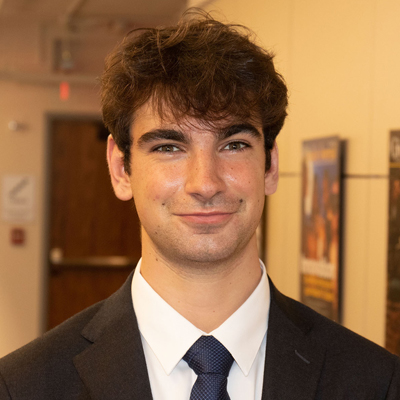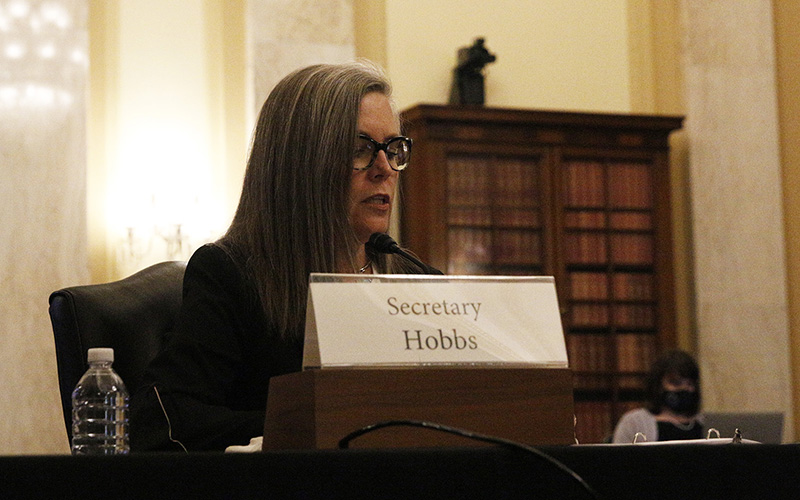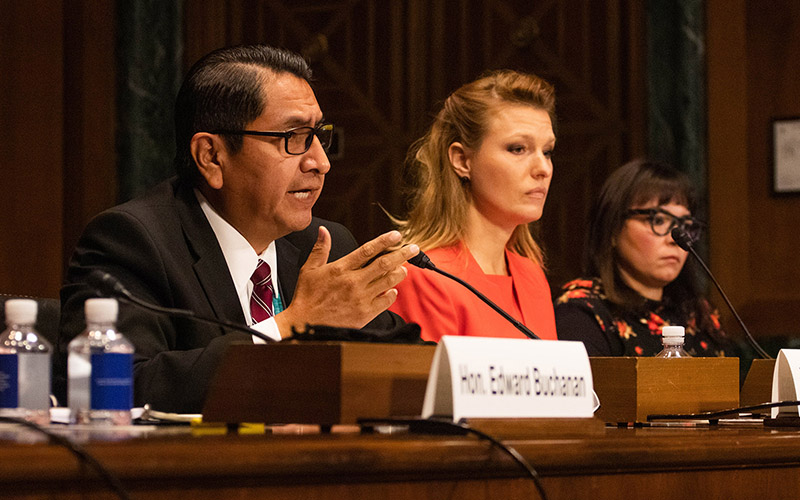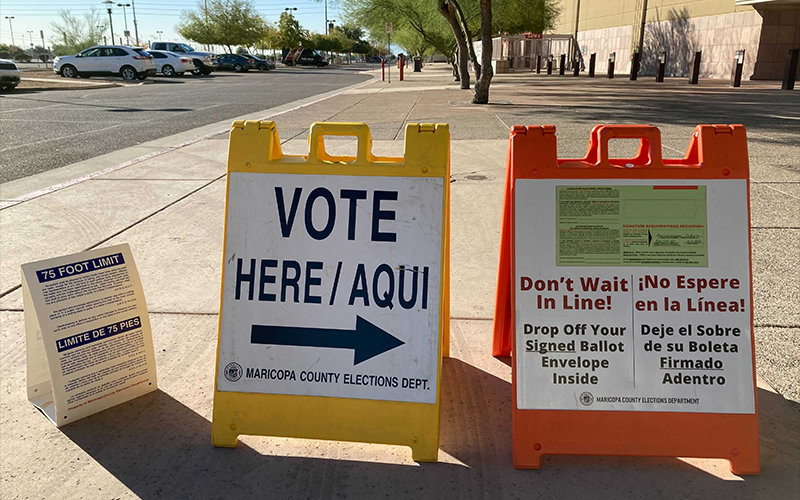WASHINGTON – It’s been almost a year since the 2020 elections, but Arizona Secretary of State Katie Hobbs told a Senate panel Tuesday that it’s not over for her staff, who have been subject to “near constant harassment” from election deniers.
Hobbs was one of several election officials who shared stories of harassment, death threats and attacks on election integrity over the past year, and who urged the Senate Rules Committee to pass federal legislation that they said would go a long way toward protecting future elections.
“The idea was to bring attention to the prevision of the Freedom to Vote act, and why it’s important to have those previsions in federal law,” Hobbs said after Tuesday’s hearing. “Hopefully, even if the whole bill doesn’t pass into law that there is an increased interest in passing federal protection to address these threats to election workers.”
The hearing came less than a week after Senate Republicans blocked a vote on that act, which would broaden voter registration by requiring same-day and automatic registration, make it harder to purge voter rolls and make Election Day a national holiday. It would also make it a crime to interfere with someone trying to register and require states to perform post-election audits, among other changes.
Republican lawmakers have objected to the imposition of federal rules on elections, what they say should be a state or local decision. That was echoed Tuesday by Kentucky Secretary of State Michael Adams, who told the hearing that one version of election policy “foisted at a national level upon all the states, I don’t think it will be well received.”
“I think people have confidence in me and their county clerks and their poll workers and their governor for that matter … and they see us as directly accountable and they can trust us more on these issues,” he said. “To be clear, I don’t think Congress should tell California or Arizona or Utah or any state that does things differently from Kentucky how to run their elections either.”
Adams agreed with the other witnesses that threats against election officials have tainted the system. But he cautioned against blaming only the right, saying election workers in his state were harassed from the left, after critics claimed the state was suppressing votes.
“Addressing this should not be a partisan issue, because misinformation is not limited to one side,” Adams said in his prepared testimony.
But many on the committee pointed to what Sen. Alex Padilla, D-Calif., called a “right-wing ecosystem of misinformation and disinformation continues to perpetuate the big lie, that the election was stolen.”
Hobbs noted the anniversary of the election is next week, but that, “Unfortunately, in Arizona and in other states, some choose to believe that the 2020 election has still not ended.”
“To be clear: President Joseph R. Biden won Arizona’s electoral votes in a free and fair election, an election that was conducted according to the letter of the law,” she said.
But former President Donald Trump continues to insist that fraud cost him the election. Those claims have persisted despite dozens of unsuccessful legal challenges by Trump backers and, in Arizona, a months-long review of Maricopa County votes by Trump supporters that found Biden actually won more votes in the county than first thought.
Hobbs, a Democrat, said the claims persist even though the presidential election results in Arizona were certified by her and Gov. Doug Ducey and Attorney General Mark Brnovich, both Republicans, and Chief Justice Robert Brutinel, who was appointed by a Republican.
None of that calmed election deniers, Hobbs said.
“Two weeks after the election, armed protesters gathered outside my home and chanted, ‘Katie come out and play, we are watching you,'” Hobbs said during her testimony.
The threats were not only directed at her, but at her family, too.
“I expected that sometimes I would have constituents who were unhappy with me,” she said. “But I never expected that holding this office would result in far-right trolls threatening my children, threatening my husband’s employment at a children’s hospital, or calling my office saying I deserve to die.”
Al Schmidt, a commissioner on the Philadelphia Board of Elections, pointed to a recent report that found one in five election officials listed threats to their lives as a “job-related concern,” threats that he said continue to this day.
“They rise in intensity and frequency each time elected officials and bad-faith political actors spread disinformation about the 2020 election,” Schmidt said.
All the witnesses said the attacks have weakened faith in the system while the threats of violence are driving away seasoned election workers – which they fear will further weaken the system.
The solution, Hobbs said, is for Congress to act, telling the senators, “Now it’s your turn.” Schmidt urged lawmakers to act.
“I know working across party lines to find common ground on any topic is challenging, let alone on election reform,” said Schmidt. “But for the sake of our Republic I hope you can work together to protect election administrators and our democratic institutions.”
“Because, as Benjamin Franklin said, it’s a republic, ‘If you can keep it,'” he said.



